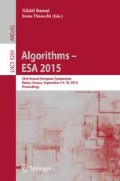Abstract
We introduce Quasi-Threshold Mover (QTM), an algorithm to solve the quasi-threshold (also called trivially perfect) graph editing problem with a minimum number of edge insertions and deletions. Given a graph it computes a quasi-threshold graph which is close in terms of edit count, but not necessarily closest as this edit problem is NP-hard. We present an extensive experimental study, in which we show that QTM performs well in practice and is the first heuristic that is able to scale to large real-world graphs in practice. As a side result we further present a simple linear-time algorithm for the quasi-threshold recognition problem.
Access this chapter
Tax calculation will be finalised at checkout
Purchases are for personal use only
Preview
Unable to display preview. Download preview PDF.
References
Bader, D.A., Meyerhenke, H., Sanders, P., Wagner, D.: Graph Partitioning and Graph Clustering: 10th DIMACS Implementation Challenge, vol. 588. American Mathematical Society (2013)
Blondel, V., Guillaume, J.L., Lambiotte, R., Lefebvre, E.: Fast unfolding of communities in large networks. Journal of Statistical Mechanics: Theory and Experiment 2008(10) (2008)
Boldi, P., Codenotti, B., Santini, M., Vigna, S.: Ubicrawler: A scalable fully distributed web crawler. Software - Practice and Experience 34(8), 711–726 (2004)
Boldi, P., Rosa, M., Santini, M., Vigna, S.: Layered label propagation: A multiresolution coordinate-free ordering for compressing social networks. In: Proceedings of the 20th International Conference on World Wide Web (WWW 2011), pp. 587–596. ACM Press (2011)
Boldi, P., Vigna, S.: The WebGraph framework I: Compression techniques. In: Proceedings of the 13th International Conference on World Wide Web (WWW 2004), pp. 595–602. ACM Press (2004)
Brandes, U., Hamann, M., Strasser, B., Wagner, D.: Fast quasi-threshold editing (2015), http://arxiv.org/abs/1504.07379
Cai, L.: Fixed-parameter tractability of graph modification problems for hereditary properties. Information Processing Letters 58(4), 171–176 (1996)
Chiba, N., Nishizeki, T.: Arboricity and subgraph listing algorithms. SIAM Journal on Computing 14(1), 210–223 (1985)
Chu, F.P.M.: A simple linear time certifying lbfs-based algorithm for recognizing trivially perfect graphs and their complements. Information Processing Letters 107(1), 7–12 (2008)
Drange, P.G., Dregi, M.S., Lokshtanov, D., Sullivan, B.D.: On the threshold of intractability. In: Proceedings of the 23rd Annual European Symposium on Algorithms (ESA 2015). LNCS. Springer (2015)
Drange, P.G., Pilipczuk, M.: A polynomial kernel for trivially perfect editing. In: Proceedings of the 23rd Annual European Symposium on Algorithms (ESA 2015). LNCS. Springer (2015)
Görke, R., Kappes, A., Wagner, D.: Experiments on density-constrained graph clustering. ACM Journal of Experimental Algorithmics 19, 1.6:1.1–1.6:1.31 (2014)
Leskovec, J., Krevl, A.: Snap datasets: Stanford large network dataset collection (June 2014), http://snap.stanford.edu/data
Nastos, J., Gao, Y.: Familial groups in social networks. Social Networks 35(3), 439–450 (2013)
Ortmann, M., Brandes, U.: Triangle listing algorithms: Back from the diversion. In: Proceedings of the 16th Meeting on Algorithm Engineering and Experiments (ALENEX 2014), pp. 1–8. SIAM (2014)
Rotta, R., Noack, A.: Multilevel local search algorithms for modularity clustering. ACM Journal of Experimental Algorithmics 16, 2.3:2.1–2.3:2.27 (2011)
Staudt, C., Sazonovs, A., Meyerhenke, H.: Networkit: An interactive tool suite for high-performance network analysis (2014), http://arxiv.org/abs/1403.3005
Traud, A.L., Mucha, P.J., Porter, M.A.: Social structure of facebook networks. Physica A: Statistical Mechanics and its Applications 391(16), 4165–4180 (2012)
Wolk, E.S.: A note on “the comparability graph of a tree”. Proceedings of the American Mathematical Society 16(1), 17–20 (1965)
Yan, J.H., Chen, J.J., Chang, G.J.: Quasi-threshold graphs. Discrete Applied Mathematics 69(3), 247–255 (1996)
Author information
Authors and Affiliations
Corresponding author
Editor information
Editors and Affiliations
Rights and permissions
Copyright information
© 2015 Springer-Verlag Berlin Heidelberg
About this paper
Cite this paper
Brandes, U., Hamann, M., Strasser, B., Wagner, D. (2015). Fast Quasi-Threshold Editing. In: Bansal, N., Finocchi, I. (eds) Algorithms - ESA 2015. Lecture Notes in Computer Science(), vol 9294. Springer, Berlin, Heidelberg. https://doi.org/10.1007/978-3-662-48350-3_22
Download citation
DOI: https://doi.org/10.1007/978-3-662-48350-3_22
Published:
Publisher Name: Springer, Berlin, Heidelberg
Print ISBN: 978-3-662-48349-7
Online ISBN: 978-3-662-48350-3
eBook Packages: Computer ScienceComputer Science (R0)

